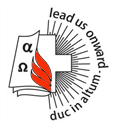News 'Matters India' Interviews Bishop Lumen Monteiro CSC
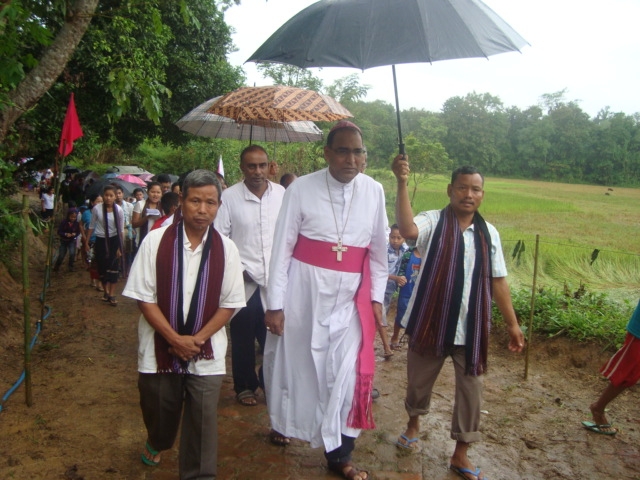
Bishop Lumen Monteiro of Agartala has completed 25 years as the first prelate of the northeastern state of Tripura, once a land of tension between tribals and Bengalis. The Holy Cross bishop in India shared with Jesuit Father Irudhaya Jothi of Matters India his life and mission in the third smallest state in India.
Matters India: Congratulations for completing twenty five years as the first Catholic bishop of Tripura. What are your thoughts as you celebrate the jubilee?
Bishop Lumen Monteiro: I cannot imagine that I am celebrating my silver jubilee. My thoughts are gratitude to God, gratitude to my collaborator priests and religious, and gratitude to the lovely people of the diocese. I feel truly blessed. With Mother Mary I can say, my soul glorifies the Lord and my spirit rejoices in God for my Savior. For the Almighty has done great things to me and through me.
What were your initial challenges you faced?
My whole life as bishop has been a challenge as everything had to begin from the scratch — from personnel to property, from finances to infrastructure, and from laity to faith formation. The establishment stage was challenging, more so because we had a very tiny Christian community and not enough church personnel. To make matters worse the political situation was also bad. We couldn’t move freely to the villages. But for me, village visit was a priority, because we had to follow-up and support our new formed Catholic communities. There were occasions when our religious and lay people came under the attack of bullets. One Holy Cross priest – Father Victor Crasta — even lost his life. Yet, I was hopeful, never wavered, believed in God, in the openness of the people to the Christian faith, and went ahead. “O God Lead us onward,” was my prayer at every step. St. Mother Teresa once said, “To keep a lamp burning, we have to keep putting oil in it.” The oil that gives me strength and keeps me positive and peaceful comes from my daily meeting with the Lord in meditation.
I have experienced hardships and difficulties but they don’t mean that God has abandoned me. On the contrary, as St. Paul says, “we boast of our troubles, because we know that trouble produces endurance, endurance brings God’s approval, and his approval creates hope. This hope does not disappoint us, for God has poured out his love into our hearts.” This awareness has given me the energy to stay positive and face challenges.
Looking back, what have been the achievements of the diocese?
Evangelization was my first priority and our lay people got involved in the evangelization work along with some priests and religious. They formed teams of evangelization in the parish and went out to preach. Many learned the local languages. For me, the priority was to visit every new community in the Diocese, very often on foot, staying in their villages and instructing them and sharing in their life situation. Our Schools, in the interior areas Tripura and the work of the Sister Nurses in the medical field have been another way of service by the Catholic Church to the community.
Another ‘achievement’ (if I could say so) was establishing JUST with a focus on development work, especially the SHGs across the State.
Who all have contributed in the Church’s growth in this state?
If we have achieved what we have till today, the credit obviously goes to my collaborators, namely, the priests and religious whom I have always called “my hands and feet.” Then we have the Lay Leaders. Though few in numbers they were the ones who spread the Good News. The enthusiastic group of mission-minded priests and religious was my co-travelers on the journey. They prepared the laity for the mission,.
Are there any challenges left?
The challenges will always be there in a dynamic community – the challenge to become better; the challenge to reach out by crossing borders of all sorts; the challenge to work as a united family. We are also challenged not to become mere spectators, sitting on our past laurels or brooding on our failures. We have to move forward. The jubilee theme, ‘Rejoice with Gratitude – Renew with Hope,’ gives us the needed impetus to move onward. It is time we ventured into newer and more challenging avenues.
The purpose of missionary activity is not so much to “do something for others” as to “transform others into doers.” active participants in the saving work of God. My motto for myself and the diocese is “Lead Us Onward.” To live this motto today means to constantly overcoming challenges and borders of languages, ethnicities, cultures and religions, as well as bridge the widening gap between the rich and the poor. I believe that the metaphors of today’s mission must be expressed in terms of solidarity, outreach to the poor, in dialogue and sharing. Harold McAlindon seemed to have said, “Do not follow where the path may lead. Go instead where there is no path and leave a trail.
What are you hopes, vision and opportunities for the diocese in the context of Synod on Synodality?
The Laity are the backbone of the diocese. From the very beginning we followed the synodal way of meeting them at the grassroots. Though the concept of Synodality may be relatively new to the average Catholic, we began the process when we set out to implement our Diocesan Pastoral Plan, called the Reflecting-Sharing-Recording method. It was conducted in all parishes and mondolis over two years. A synodal church according to Pope Francis is a “church that listens” (EG#171) — listening to each other and everyone listening to the Holy Spirit. Pope Francis wants to involve all the faithful in the life and missions of the Church and to ward off the danger of clericalism. He wants to shift from a pyramidal Church to a participative one. This has prompted him to introduce an expanded concept of Synodality as fostering greater communion and engagement in mission. As long as we see ourselves as a dynamic organization, we will have to pause, evaluate, make new plans, and move on with new vigor and vitality. Move onward together is the core concept Synodality.
How has the Church impacted Tripura state?
Education and social transformation. The Catholic schools in the diocese, no matter which congregation manages them, are bound to make leaders of their students. Many of our region’s finest scholars, public officials, business leaders, doctors and educators today were students of our schools. The poor have found their dignity and God-given talents in our classrooms.
Another area we focused was to produce religious literature, prayers and hymns in the local languages of Kokborok, Darlong, Halam, Krangkhawl, and Molsom. The prayer book, Loge Song, contains all the basic prayers of the Church both in Kokborok and Bengali languages. It also has hymns in 12 languages of Tripura.
The Church in Tripura has played a crucial role to improve the socioeconomic status of the deprived people through formal and informal education, empowerment, and healthcare. We have tried to break the cycle of deprivation and poverty to some extent and enabled the marginalized people to assert their rights and lead a dignified life. Then we have set up schools, churches, chapels, hostels, hospital, pastoral center, the Bishop’s House. These buildings now dot the map of Tripura.
The Jana Unnayan Samiti Tripura (JUST), the Church’s socioeconomic development agency, has promoted non-formal education. Registered in 1997, it also promotes good governance, gender empowerment, justice and peace, skilling, microfinance, livelihood, partnerships building, natural resource management, and so on.
Tripura is the only mission entrusted to the Holy Cross congregation in India. How did the congregation come to this part of the world?
The Holy Cross Fathers came to this region more than 150 years ago. In fact the founder of our congregation, Blessed Basil Moreau, sent his first missionaries to Bengal in 1852, which was then a part of the British India. Those pioneer missionaries came to Tripura, Mizoram, Meghalaya and Assam. They had left a legacy of village visits that included catechizing, medicines, informal education, and the like. However, there were fewer of them in this part of India, but did great pioneering missionary work in East Bengal, now Bangladesh.
The earlier foreign missionaries in India had very little access to the indigenous villages spread across Tripura, where the most amount of evangelization work has taken place. Mariamnagar parish, established in 1939, was the center of the Tripura mission. The first schools were in Agartala town, Bengali medium at Reshombagan and English medium at Durjoynagar, which celebrated its golden jubilee this year.
Tripura was under the Marxists for decades and now the BJP is in power. How has the change affected the state?
We have been working in tandem with the state governments irrespective of the party that may be in power. We have been working with the government in the education sector through our schools, in the social sector under the aegis of JUST our social development organization. Some of the activities with the government are Intensive Malaria Control Program, Self Help Groups, NERLP, Organic Farming, and Women Empowerment. Other initiatives with the government have been through our schools and our sister nurses in the hospitals and village dispensaries. And we have been involved in activities to bring about peace and harmony in the state. The Church has always been a champion of peace and communal harmony initiatives. Peace building and conflict transformation is a beautiful ongoing program that aims at building peace and harmony.
Is the ethnic violence in the state on the decline now?
Yes indeed, and we are happy today that peace has returned in Tripura. Insurgency activities were at their peak when the diocese was erected and the situation was always tense. Movement to villages and pastoral work were badly affected. One reason for the insurgency was the great divide between the two communities in Tripura, the tribal and non-tribal people. In our dealing with students we noticed how deep that divide was and how bitter their feelings were. So through JUST we took up peace initiatives to deal with the situation, starting with students in our schools. Peace Clubs were formed in our schools to bring awareness to the young minds. We have the Peace Centre run by the Don Bosco Fathers which focused on preservation of tribal culture by promoting tribal languages and devotional hymns. This has helped the minority community to use positive means to promote peace. ASHA Centre run by the Holy Cross Fathers is another Institution where peace building efforts are made through seminars and dialogue and training.
Profound changes in culture, politics, education, economics and religion are all occurring together in many states, more so in our little state of Tripura. A new sense of the dignity of the individual, and with it, the urge for a new status in society, the changing status of women, new parent-child relations, educational progress and the increased mobility of labor and urbanization, and today the post Covid-19 scenario, are some characteristics of today’s Tripura
At the same time the release from the restraints of traditional social customs and moral codes has led to social and individual irresponsibility and demoralization. There is the native resurgence that is struggling to forge a new identity on the ruins of old ethnic identity. Tripura consists of 19 ethnic groups with distinct language and cultures. Yet a sturdy divide of cultural and linguistic difference between the tribal people and the Bengali speaking people is present. The emergence of a growing competition for limited social and economic space further intensifies the hostilities and prejudices.
More News
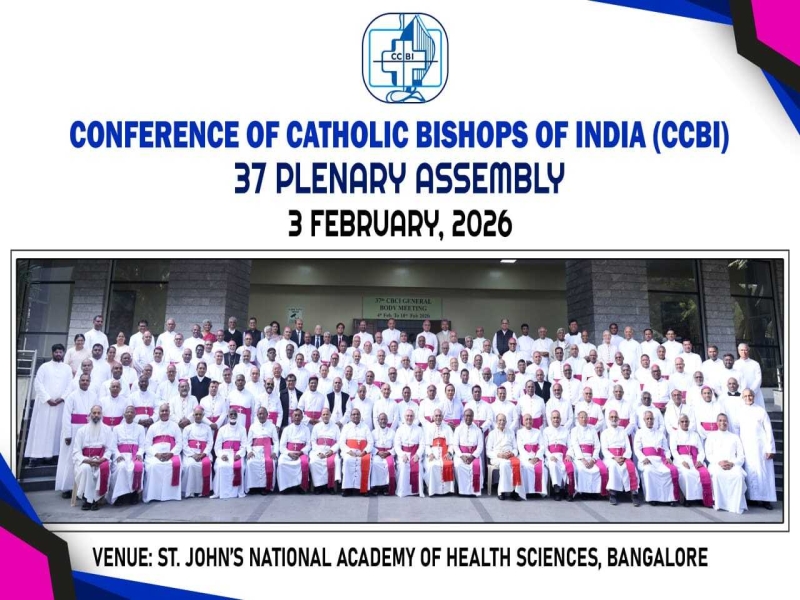
Conference of catholic Bishops of india (CCBI)
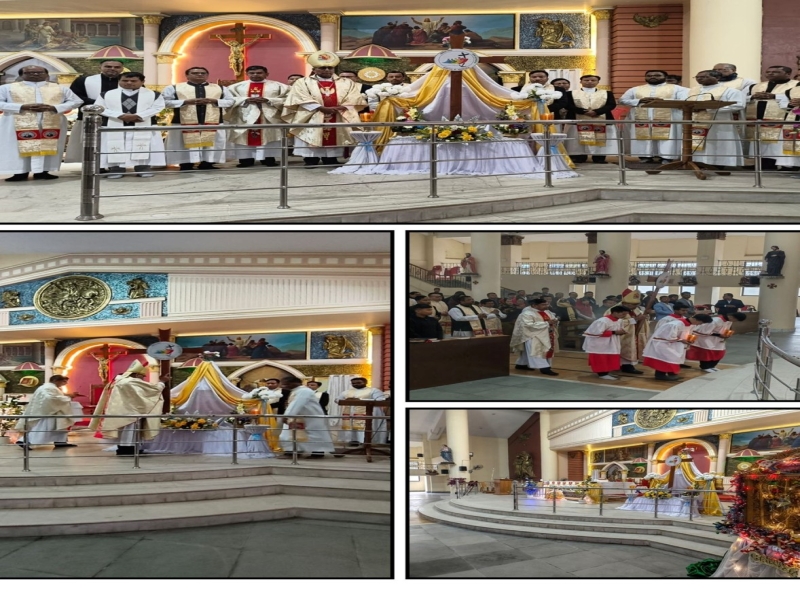
Closing Ceremony of the Jubilee Year of Hope - 2025
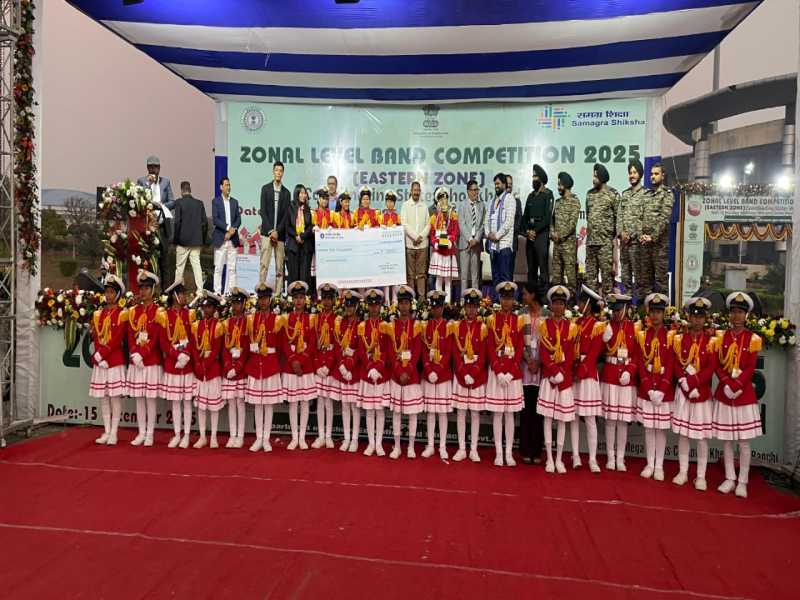
Holy Cross Higher Secondary School, Karbook, bags First prize at Jharkhand in East Zonal Band Competition
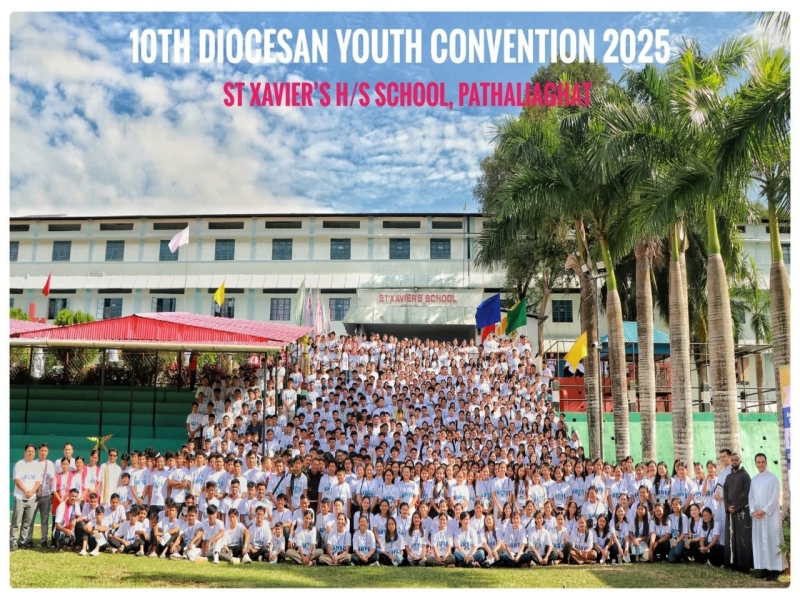
10th Diocesan Youth Convention, Pathaliaghat, 2nd -5th Oct 2025
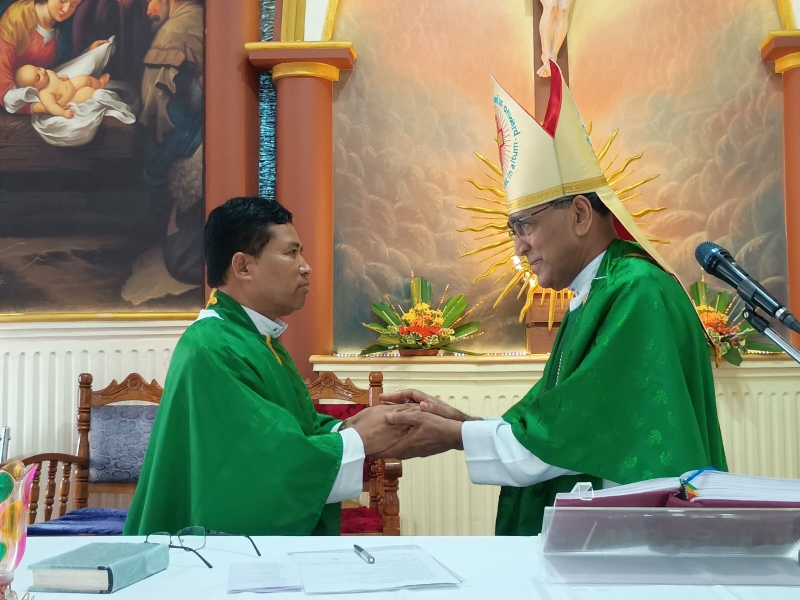
Installation of Fr. Jerome CSC, as the P.P. of Tuikarmaw Parish, 3rd August 2025
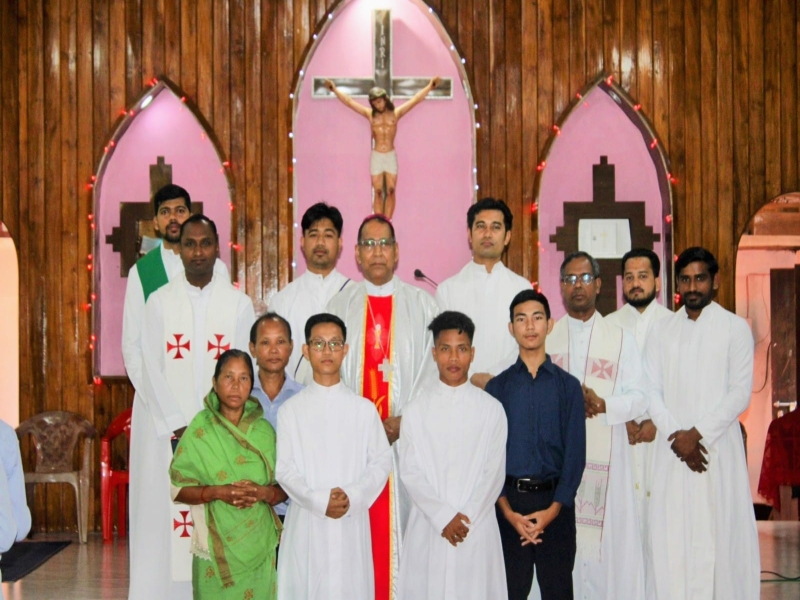
Vestition of Bros. Monojoy Reang and Jubilee James at Gonda Twisa on 29th July 2025
